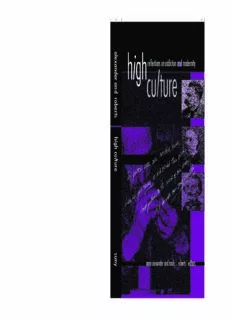
High culture : reflections on addiction and modernity PDF
Preview High culture : reflections on addiction and modernity
CULTURAL STUDIES/ PHILOSOPHY high a high reflections on addiction and modernity l culture e x rreeflfleeccttiioonnss oonn aaddddiiccttiioonn aanndd mmooddeerrnniittyy a n ccuullttuurree anna alexander and mark s. roberts | editors d e r This is the first comprehensive text to address addiction and its multiple effects on and extensions a into art, literature, philosophy, and psychology. Most research into addiction has taken place within n d the disciplines of medicine, criminology, politics, and social psychology. When seen from a broad cultural r perspective, however, addiction emerges directly alongside modernity, haunting its various discourses o b of digression, dissent, and the transcendence of the commonplace. Who could even imagine modern e writing without the addictive, visionary excesses of writers like Baudelaire, DeQuincey, Poe, Burroughs, r t s or Artaud? Or, for that matter, modern culture without its “outsiders,” its incorrigible addicts, its defaced subjects: smokers, users, overeaters, alcoholics, the insane? Taking a cultural studies approach to addic- tion, High Culture offers a readable and accessible collection of essays on these socially marginalized practices and discourses so central to modernity. h i g “This book unveils a latent but profoundly significant—and largely ignored—dimension of modernity, h namely, the relationship to addiction. The contributors focus important new light on a dimension c u of modern life that is omnipresent and at the same time profoundly neglected. This is crucial scholar- l t u ship—applied philosophy—and powerful testimony that philosophy has much to say about every- r e day life.” — Michael Dorland, Carleton University “This is a useful, multifaceted collection foregrounding a phenomenon that is too little examined from ad epvhoitleodso tpoh cicualtlu orra lt hcreiotirceistmica, li tp iosi natd doifc tviioenw.”—i—f a nByabthetitneg E .d Beasbeircvh,e as uathttoer notfi oNnie tizns cthhee’s Pghriolowsoinpghy l iotfe Sraciteunrcee colberg visual com AMnanrak ASl.e Rxaonbdeertrs teteaachchese sa tin t hthe eS iDmeopnaer tmdee nBte aouf vPohiril oInsostpihtuyt ea, t CSotnactoer dUian ivUenrisviteyr soitfy Nine wM oYnotrrke aalt. munication design Stony Brook. A volume in the SUNY series, Hot Topics: Contemporary Philosophy and Culture Ron Scapp and Brian Seitz, editors s State University of New York Press u n anna alexander and mark s. roberts || editors www.sunypress.edu y HIGH CULTURE SUNY series, Hot Topics: Contemporary Philosophy and Culture Ron Scapp and Brian Seitz, editors H C IGH ULTURE Reflections on Addiction and Modernity edited by ANNA ALEXANDER and MARK S. ROBERTS STATE UNIVERSITY OF NEW YORK PRESS Published by STATEUNIVERSITYOFNEWYORKPRESS, ALBANY © 2003 State University of New York All rights reserved Printed in the United States of America No part of this book may be used or reproduced in any manner whatsoever without written permission. No part of this book may be stored in a retrieval system or transmitted in any form or by any means including electronic, electrostatic, magnetic tape, mechanical, photocopying, recording, or otherwise without the prior permission in writing of the publisher. For information, address State University of New York Press, 90 State Street, Suite 700, Albany, NY 12207 Production by Marilyn P. Semerad Marketing by Fran Keneston Library of Congress Cataloging-in-Publication Data High culture : reflections on addiction and modernity / edited by Anna Alexander and Mark S. Roberts. p. cm. — (SUNY series, hot topics) Includes bibliographical references and index. ISBN 0-7914-5553-X (alk. paper) — ISBN 0-7914-5554-8 (pbk. : alk. paper) 1. Substance abuse. 2. Creative ability. 3. Inspiration. 4. Civilization, Modern. I. Alexander, Anna, 1956– II. Roberts, Mark S. III. Series. HV4998 .H544 2002 394.1'4—dc21 2002029181 10 9 8 7 6 5 4 3 2 1 When he wanted to formulate the task of a philos- ophy yet to come, Friedrich Nietzsche committed this thought to writing: “Who will ever relate the whole his- tory of narcotica?—It is almost the history of ‘culture,’ of our so called high culture”.... Our work settles with this Nietzschean “almost”—the place where narcotics articulates a quiver between history and ontology. Addiction will be our question: a certain type of “Being-on-drugs” that has everything to do with the bad conscience of our era. —Avital Ronell, Crack Wars CONTENTS ACKNOWLEDGMENTS xi INTRODUCTION 1 Anna Alexander and Mark S. Roberts PART I. PHILOSOPHICAL AND LITERARY REFLECTIONS ON ADDICTION CHAPTER ONE THE RHETORIC OF DRUGS 19 Jacques Derrida CHAPTER TWO NIETZSCHE’S DIONYSIAN HIGH: Morphin’ with Endorphins 45 David B. Allison CHAPTER THREE ARIADNE’S THREAD: Walter Benjamin’s Hashish Passages 59 Gary Shapiro vii viii HIGH CULTURE CHAPTER FOUR PROFANE HALLUCINATIONS: From The Arcades Project to the Surrealists 75 Alina Clej CHAPTER FIVE HEIDEGGER’S CRAVING: Being-on-Schelling 95 David L. Clark CHAPTER SIX TRAUMA, ADDICTION, AND TEMPORAL BULIMIA IN MADAME BOVARY 133 Elissa Marder CHAPTER SEVEN BAUDELAIRE, ARTAUD, AND THE AESTHETICS OF INTOXICATION 157 Allen S. Weiss CHAPTER EIGHT “JUNK” AND THE OTHER: Burroughs and Levinas on Drugs 173 Jeffrey T. Nealon PART II. SOCIO-CULTURAL AND PSYCHOLOGICAL REFLECTIONS ON ADDICTION CHAPTER NINE SOCIALLY SIGNIFICANT DRUGS 199 Félix Guattari CHAPTER TEN FREUD’S PHARMACY: Cocaine and the Corporeal Unconscious 209 Anna Alexander CONTENTS ix CHAPTER ELEVEN SCHREBER’S ECSTASIES, OR WHO EVER LISTENED TO DANIEL PAUL? 233 Zvi Lothane CHAPTER TWELVE SMOKE SCREEN: The Cultural Meaning of Women’s Smoking 261 Lorraine Greaves CHAPTER THIRTEEN LOVE JUNKIES 279 Alphonso Lingis CHAPTER FOURTEEN POSSESSION, ADDICTION, FRAGMENTATION: Is a Healing Community Possible? 297 Bruce Wilshire CHAPTER FIFTEEN GAMBLING AND ADDICTION 309 Jon Elster CHAPTER SIXTEEN ADDICTS WITHOUT DRUGS: The Media Addiction 339 Mark S. Roberts CHAPTER SEVENTEEN THE DRUG ADDICT IN ABSENTIA: Hidden Populations of Illicit Drug Users and the Gaze of Power 355 John Fitzgerald CONTRIBUTORS 377 INDEX 381
Description: